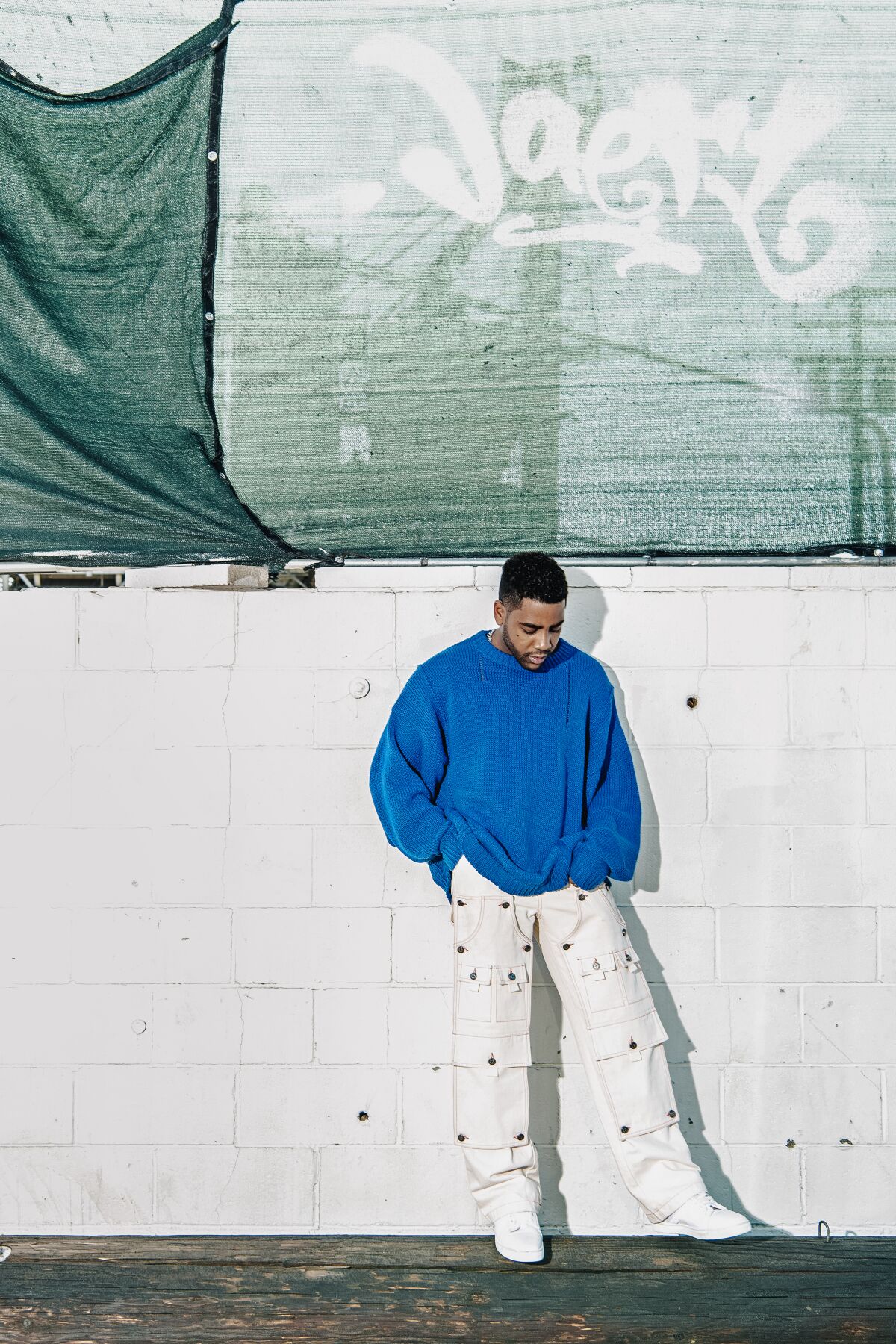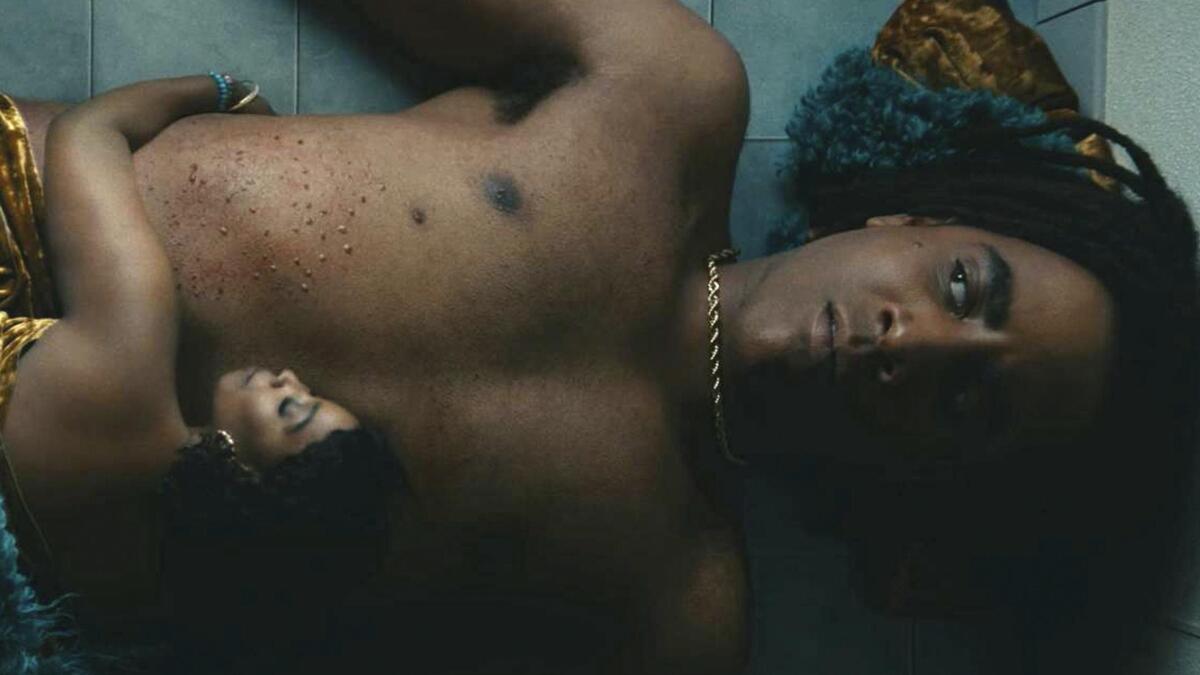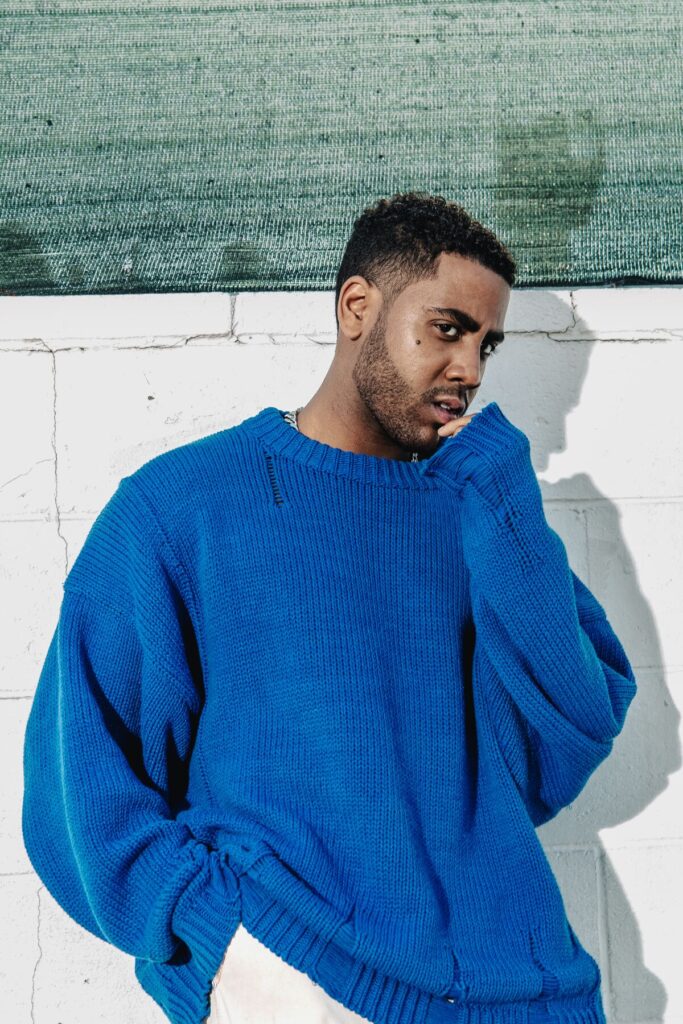Like his 2018 feature debut, “Sorry to Bother You,” Boots Riley’s new Prime Video show, “I’m a Virgo,” is tough to pin down.
The coming-of-age, anti-capitalist, superhero sendup stars Jharrel Jerome as Cootie, a 13-foot-tall man who was raised by his surrogate parents Lafrancine and Martisse (Carmen Ejogo and Mike Epps). They have kept him confined to their Bay Area home well into his teenage years in an effort to protect him — regularly showing him newspaper clippings of other giants who have been killed as proof that the outside world isn’t safe. Cootie eventually breaks free and tries to find friendship, love and meaning in his life.
The show is set in a hyperstylized, distorted version of Oakland, and some of the supporting characters include his love interest, Flora (Olivia Washington, Denzel’s youngest), a fast-food clerk who moves faster than the speed of sound; a young activist called Jones (Kara Young), whose impassioned speeches about systemic inequality and oppression quite literally put listeners in a trance; and a deranged superhero cop known only as the Hero (Walton Goggins). A “Simpsons”-esque animated series that inspires feelings of existential dread makes regular appearances.
Jerome, whose earnest, well-meaning Cootie brings all these disparate elements together, says he was just as thrown by the plot as the audience will surely be when he first read the script. “I just woke up to an email from Boots one day,” he said. “The title of the email was ’13 Foot Tall Black Man in Oakland.’ So imagine that. We chopped it up like a week later about everything. He’s such a passionate, visionary person; the way he presented it all to me just had me floored. I knew by the end of the meeting that I had to join this project and do it with him.”
The “Moonlight” actor won a lead actor Emmy in 2019 for his performance in Ava DuVernay’s acclaimed Netflix limited series “When They See Us” about the Central Park Five. The Times caught up with Jerome to talk about astrology, shooting with miniatures and his plans to become the next Clint Eastwood.
Jerome said he had to think beyond the size of this character and focused on his psyche. “I think that’s what makes him so adorable, because he moves with this kindness and this love that is just naive.”
(Mariah Tauger / Los Angeles Times)
How did you step into Cootie’s gangling, somewhat awkward skin?
For a long time, I was very focused on his height, because that is what sticks out for the character. But as I got deeper into his psyche and the way he feels, I realized that the show isn’t called “I’m a Giant,” it’s called “I’m a Virgo” for the reason that he’s an intricate person full of all these different emotions.
Being confined his whole life by his parents obviously has made him [behave] a certain way. He’s 19 years old, but he’s about 13 [socially]. So it was really playing with the naivete blended with the wisdom that he had. When you hear stories about parents keeping their kids inside for their whole lives, it’s torture or abusive, but really it was opposite in this show. Cootie was nurtured, taught important life lessons and raised well so all he knows is love. I think that’s what makes him so adorable, because he moves with this kindness and this love that is just naive.
As a Bronx native, how did you shed that to take on Oakland-isms?
In the beginning, I definitely was thinking about putting on an Oakland dialect. I talked to Boots about it, and we went back and forth. [He] even sent me some different clips of people speaking in the Bay Area accent, and I was getting into it for a little bit. I went through different phases of trying to figure out who Cootie was, and in that phase I realized, well, Cootie has never been outside. So even though he is from the Bay, he’s not from the Bay. He’s from that Victorian home, he’s from his parents. And so then I started to shift my focus onto their dialects. Carmen playing Lafrancine, she has a very soft-spoken, clean, proper tone to her. And so I ended up [deciding] that he was inspired by his mother and by the Hero.
What was it like shooting the forced perspective scenes and acting with miniatures as props?
It was very challenging. Two parts of my brain had to work at the same time: One part was remembering the lines, choices, the emotions — who Cootie was — and then the other side was the technical part. I had to get used to looking at a green X-mark to do all my scenes. I didn’t look any of my scene partners in the eyes for any of the performances. So it was really about tapping in beforehand and doing enough rehearsal that connected us.
The first two, three weeks of shooting, I was very, very uncomfortable. I was constantly going up to Boots on cut like, “Was that right? Was that good? Is that Cootie? Is that making sense?” I realized the only reason I was in my head was because of all those technical challenges. I’m so used to eye contact, I’m so used to tapping in and being locked in with a scene partner, so it was definitely hard.

Unlike his character, Jerome is a Libra. “So just based off of what I’ve been told, I’m a hopeless romantic, which I don’t disagree with.”
(Mariah Tauger / Los Angeles Times)
This next one is a three-part question. Do you believe in astrology? As a Libra, what was it like to channel Virgo energy? And how does Cootie exemplify Virgo energy?
OK so the first one, it’s not that I don’t believe in astrology [laughs]. I definitely understand it and how amazing it is and how you can sort of guide certain choices and be aware of who you are through learning about your own sign. But yeah, I’m not into signs. I still don’t even know about my own sign. I know more about a Virgo now than a Libra, which is funny.
I don’t know much about what makes me a Libra, but the people around me seem to. So just based off of what I’ve been told, I’m a hopeless romantic, which I don’t disagree with. I am someone who wears their heart on their sleeve, and that can be great because it allows for emotional availability, but it can also be challenging because I can get sensitive. So I definitely had to throw all that out because that’s not what a Virgo is at all.
A Virgo is very strong-minded and believes in what they say. Virgos are like, “I know it all even if I’m wrong.” And so it’s not so much who I am, but I love being able to lean on all those facts about Virgos. It was cool to be like, “How do I make this character? Oh bet, let me just go on Google, look up what a Virgo is and their traits and who they get along with,” because it was able to help me shape certain choices that I was making. And what was the third one one more time?
How does Cootie exemplify Virgo energy?
He knows it all. And it’s so funny because he doesn’t know anything. That’s what makes Cootie so lovable. There’s a moment, I forget the exact line, where he looks at his friends and he says something super wordy and intricate. And they look at him like, “Bro, that’s not what people say.” And he’s like, “Yes, that is exactly what people say.” And I think right there, that’s the epitome and the beauty of a Virgo because somebody might be like, “Oh, that’s hardheaded.” But somebody else might be like, “Well, there’s such a confidence to that.” There’s a lot of facts about a Virgo, but the one that really stuck out to me was that sort of security in what they know, and it made playing Cootie fun.
What was it like working with and being directed by Boots?
Like working at a circus. He’s like a box of wonders. There’s no dull moment on set, no scene where there wasn’t an immense amount of creativity and thought put in, so working with him is incredible. It’s like a course on creativity, imagination and not putting yourself in a box. And as an actor, that’s a very freeing and fun feeling to come onto set with. You feel like you’re coming onto a big playground.
It wasn’t all easy. There’s an underlying idea of capitalism, of racism, but Boots manages to make it fun. It’s such a genius way of approaching this concept, because there’s a lightness to it that makes you want to understand it a bit more.

Cootie (Jharrel Jerome) and Flora (Olivia Washington) in a scene from Boots Riley’s “I’m a Virgo.”
(South by Southwest Film and TV Festival)
What are some of the key takeaways and messages of this story in your opinion?
There’s like a million. Boots could fit 30 concepts into one scene sometimes. So I think this show is really cool because depending on who you are is how you see it. You could be 10 years old and watch the show, and it’s a superhero show to you. It’s a fantasy sci-fi about this giant. Or you can be a 40-year-old intellectual and say, “Well no, this show’s about anti-capitalism. It’s about the umbrella that we all fall under as Black people in America.” There might be a romantic who’s like, “That’s just a beautiful love story about two people who are so different and they fall in love.” And so I think that’s the beauty of the show: It’s so genre-bending that you could pull a million different things from it depending on how you’re feeling at the time.
What’s it like to be an actor promoting a project amid the ongoing writers’ strike? What do you think is in store for the industry in the near future?
It’s definitely a delicate time for everybody in the industry. I’m obviously on the writers’ side. I think that this strike is beyond absolutely necessary. Boots personally sent me a text when it all started and he asked me to take the torch and run the press for him because he’s a writer himself. And so I said, “Absolutely. I’ll do anything you need to support you in the movement.” Obviously it’s tricky and we all want this to be speedy and quick so we can get back to what we love to do and creating good work, but whatever has to be done has to be done.
What was your favorite scene to shoot in general?
A lot of the car scenes were fun; Cootie sitting on the back of the car and just riding. They built this mini car for me and so I got thrown onto a dolly on top of a mini car with these dolls in front and they’re pulling me around Oakland. It was actually my third night in Oakland, but I told myself not to look around until that scene because it was Cootie’s very first time looking around. So a lot of those reactions are pure because I was really just gassed by what I was seeing and by being pulled down the street and people pointing at me.
You also make music. How do you balance that with all of your acting responsibilities?
I just love music. That’s all I can say. I just love it so much. I’m so passionate about it. I’m not necessarily sitting here thinking about becoming the next Drake; I’m just thinking about how much I love the sport of hip-hop and how much I love rap. I think I have a core fan audience that loves me as an artist and appreciates my art, and if that’s who the music ultimately ends up being for the rest of my career, I will be happy. It’s just a different way of creating art. I’m looking forward to seeing what it does and how it all pans out. Whatever happens, I will go with it. But I’m about to roll out 16 songs in the next three or four months, and I’ma just let that sit in the air and do what it do.
How is making music differently fulfilling than acting?
When I was younger and just starting to act, I had already been rapping. I’ve been rapping since I was 11. You know, “Rat, hat, bat, mat, tit for tat.” Stupid lines. And then I started to get better and better. I’d be freestyling with friends, and I did rap battles and stuff like that.
And then as I started to fall in love with acting, I started to realize it’s just like rapping in a lot of ways. Improv was like freestyling; coming up with a character was like coming up with a cadence. Coming up with the speech of the character is like the flow on the mic.
Obviously the industry is the industry and things become political. Fans want to see an actor act and a rapper rap. But I think artists like Donald Glover and Lady Gaga have really stretched our minds to believe that you don’t have to just succeed in one thing; you can succeed in anything because you’re an artist. I definitely want to follow in those footsteps. Dave Bautista was a whole wrestling star, and now he’s just a really solid performer and can really body roles. So it’s a new day where I think social media has allowed a person to be more than one thing. And I want to take advantage of that, for sure.
Do you have any other creative outlets?
Yeah, I write scripts and screenplays as well. I just love stories, I think that’s what it is. So when I write, I’m either writing to rhyme or to come up with a short story or something like that. I have dreams of putting the acting away and just making movies. Clint Eastwood-ing this whole thing. I’m gonna be 84 years old directing a movie and starring in it.

